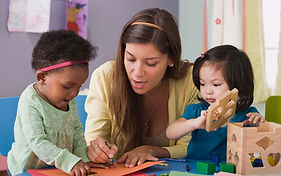 |  |  |  |
|---|
Mission & Philosophy
Early childhood education shapes the thought processes of our most precious resource, our children. It is an introduction of what's to come in this world. Our early childhood development is our baseline for our emotions, self value, and how we relate to the world around us. We feel that having a quality early education means having adults around them be engaged and both parents and teachers take a serious interest in what goes on at home and school.
To ensure a successful early educational experience, children should have a place that they feel safe and a place where they are encouraged and challenged. We believe that children learn best through play and by interacting with each other and the world around them.
We believe that the physical environment of the early education classroom should be warm, inviting, nurturing, clean, and safe. Children's art work should be on display, with an open feel and flow in the classroom. We believe we should bring the outdoors in as much as possible through the use of natural elements like rocks, stones, sticks, and twigs. We also feel that we should try to tech outdoors as much as possible. Through this we believe that children learn an appreciation for nature and they learn the responsibilities of taking care of this planet.
Play is important for young children because it enhances and builds on their social skills, emotional development, creativity, physical development, intellectual growth, and language and literacy. Children are always learning and play provides a great avenue for that. When a child is playing in art they are developing eye-hand coordination;learning to distinguish colors and shapes; learning to express their feelings and ideas; and developing small motors skills by cutting, painting, and scribbling. When a child is playing with manipulative they are learning the concepts of addition and subtraction, number concepts, and logical reasoning.
Daily routines motivate children to engage in learning experiences which enhances child development in cognitive growth, fine and gross motor skills, social competence, language skills, sensory integration. Activities throughout the day encourage problem-solving, logical thinking, and comparing/measuring. There should always be opportunities to encourage thought through dramatic play, art, and projects. We are inspired by several theorists and early childhood education models. However, the ones that are closest to our hearts are the Reggio Emillia, Piaget, Vygotsky, and Montessori.
Active family participation in an early childhood program is essential because we are modeling for our children how active and involved we should be in the decisions and things that affect our lives and our communities; communication is very important as it helps us reach a common goal in identifying the needs of a child; and it is our mission as teachers and parents, to raise independent and responsible citizens, who can contribute greatly into the prosperity of our society in the future.


